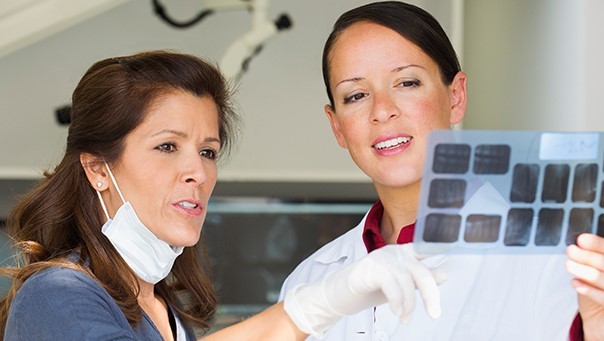-
-

BRUSHING & FLOSSING
How to BrushWhat Is the Right Way to Brush?
Proper brushing takes at least two minutes — that's right, 120 seconds!...

BRUSHING & FLOSSING
How To FlossWhat is the Right Way to Floss?
Proper flossing removes plaque and food particles in places where a toothbrush cannot easily reach... -
Science & Innovation
- Home
- Oral Health
- How to Get Rid of a Cold Sore Fast


Cold sores are painful clusters of blister-like lesions that can develop on or around the lips. The area where a cold sore develops is tender and these blisters can break and crust over. Cold sores are caused by the herpes simplex 1 virus. These sores are common and will go away on their own, but if you have a major event on your calendar – like a wedding or an important job interview – you may be wondering how to get rid of a cold sore fast.
How to Treat a Cold Sore
The following can be used to treat a cold sore:
1. Cold Compress
To help your cold sore outbreak heal quickly, the Health Direct Australia recommends soothing the cold sore with ice wrapped in a clean cloth and resisting the urge to lick, poke and pick the affected area.
If you can feel a cold sore coming on in the days before your event but it hasn't appeared yet, you can also try applying ice wrapped in a clean cloth to the area where there is tingling and tenderness. This could possibly prevent it from becoming a full-blown cold sore.
2. Cold Sore Ointment
Cold sore ointment is available over-the-counter and when it's applied frequently, it can shorten a cold sore outbreak. Health Direct Australia recommends that ointment be applied as soon as symptoms start. Remember to carefully follow the package directions of your chosen product for best results.
Avoiding Future Cold Sores
The virus that causes cold sores is a lifelong problem but there are measures you can take to prevent outbreaks. If you suffer from cold sores often, your dentist may recommend taking an antiviral medication regularly to help prevent outbreaks. Your dentist may also advise avoiding factors that trigger your outbreaks, like stress or sun exposure.
When you have an important social or work event on your calendar, it's important to know how to get rid of a cold sore fast. Try these steps to make your appearance look fabulous.
ALWAYS READ THE LABEL. FOLLOW THE DIRECTIONS FOR USE. IF SYMPTOMS PERSIST, TALK TO YOUR HEALTHCARE PROFESSIONAL.
Related Articles

If you have been experiencing problems with a tooth, you may wonder, "Do I need a root canal filling?" Root canal fillings, also known as endodontic therapy, are performed when the nerve or pulp of the tooth becomes infected

When people are told that they need a root canal therapy, they often worry that it's going to be painful.

The goal of the root canal therapy is to save a tooth that is severely infected. As Dental Health Services Victoria puts it, a dentist performs the procedure to replace damaged or infected pulp in the tooth's root canal with a root filling.
This article is intended to promote understanding of and knowledge about general oral health topics. It is not intended to be a substitute for professional advice, diagnosis or treatment. Always seek the advice of your dentist or other qualified healthcare provider with any questions you may have regarding a medical condition or treatment.
Related Products

Helping dental professionals
More professionals across the world trust Colgate. Find resources, products, and information to give your patients a healthier future








